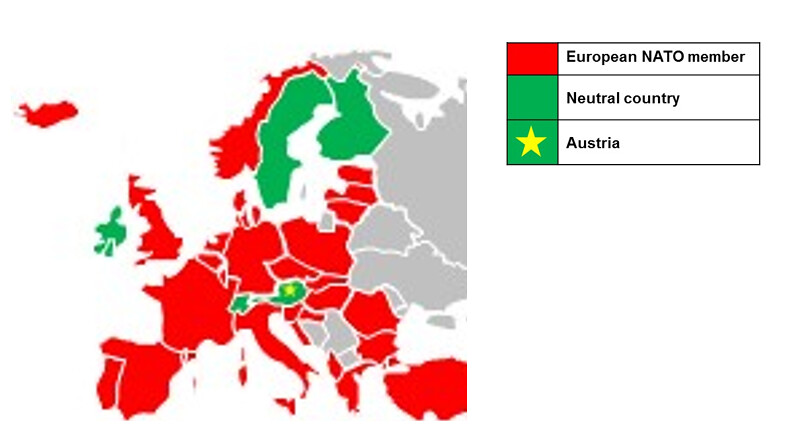Austria as an Alternative to Provocative Models: A Visitor's Guide to the Home of Security and Cooperation in Europe
While NATO allies have struggled to deal with the aftermath of the Ukrainian revolution that its members helped instigate, Carter Page shows how the unconventionalities of Austria’s political economy offer a promising model for more effective strategies across Europe.
A Model for the West in general, and Europe in particular
Austria’s Declaration of Neutrality was adopted in October 1955 following the withdrawal of Soviet, U.S., U.K. and French troops which had been stationed in the country for the decade prior in the wake of World War II. Today, this continued neutrality offers a core competitive advantage in Europe which could be further enhanced if other states followed suit. Austria’s strategic decision six decades ago and the political foundations that have run parallel to it in the years since have helped differentiate the country from the 25 European member states encumbered by the antiquated NATO structure. This legacy Cold War organization has helped create self-fulfilling prophecies of the same central threats that stood as the reason for NATO’s initial founding in 1949. While the world has fundamentally changed in the decades since the fall of the Berlin Wall less than a 6 hour drive from Austria’s Northern border, NATO’s greatest recent impact has been to travel in an alternative direction by stirring controversy with Russia.

Ironically, the Austrian economy has suffered a disproportionately severe impact from the sanctions imposed by the U.S. and E.U. in 2014. The effect of sanctions levied on Russia have severely punished some of Austria’s largest financial institutions, including Raiffeisen Bank International. Although banks today represent almost half of the total market capitalization of the Vienna Stock Exchange, they stand at the forefront of today’s economic tumult given the prominent role they have played in financing Ukrainian development. As a primary example, this unnecessary collateral damage has been particularly great in the case of Raiffeisen which holds a top five market position in Ukraine with loans of 2.9 billion Euro, 713 business outlets and 2,962,732 customers. While the performance of Hypo Alpe Adria Bank has been hampered for many years by prior mistakes of former managers who have long since left the firm, the Austrian government’s more recent efforts to help this institution recover from the scandal have been significantly impeded by U.S. and E.U. sanctions.
From Confrontation to Coalition
Werner Faymann, the leader of the left-leaning Social Democratic Party, has served as Chancellor of Austria since 2008. Reinhold Mitterlehner, the leader of the market-oriented Austrian People's Party, took office as Vice Chancellor earlier this year. This is in some ways roughly equivalent to a conservative Republican serving as Barack Obama’s Vice President. Such an arrangement known as “coalition government” may be almost unthinkable in Washington where gridlock prevails. But this domestic structure for collaboration could encourage better problem solving skills in foreign policy or at least help expose new alternative approaches. Although it does not always work perfectly, the coalition approach offers a framework of a shared political philosophy that could benefit other countries as it has similarly helped leaders to achieve progress in Austria.
Sir Harold Nicolson once noted that, “Influence is founded on seven specific diplomatic virtues, namely: truthfulness, precision, calm, good temper, patience, modesty, and loyalty.” Vice Chancellor Mitterlehner and several other Austrian leaders from both the public and private sector whom I had the opportunity to meet last week display each of these qualities in spades. Yet the admirable virtues of loyalty and calm sometimes may leave the country underestimated when surrounded by louder voices that have in stark contrast reshaped the North Atlantic community.
In contrast and as most vividly seen nearby in Ukraine, larger powers including the U.S. have incrementally helped to lead the West toward greater political and economic instability. While these tactics may have been inadvertent to a certain extent as Western leaders did not thoroughly consider the potential economic consequences of this conflict in advance, the repercussions today are apparent as clearly displayed by recent research from the Vienna Institute for International Economic Studies. Armed with that clearer and more accurate understanding of current realities, the Austrian state and businesses have helped to create a link between each side of the conflict. Some critics have suggested that 1995 decision by Austria to join NATO’s Partnership for Peace represents a step toward becoming a “post-neutral” state. To the contrary, it is more representative of that same sense of loyalty to E.U. partners.
Simon Anholt has similarly referred to Austria as “Bridge-Builders to the World”. While his reference to the country’s “record in bridging the gap between developed and developing markets” may have merit, the paradigm still underestimates its full potential by suggesting more of a transit-focused or transitory role. In contrast, Austria’s political and economic structures and norms could reflect an engine for future development across Europe and beyond if given the proper support.
The headquarters of many international organizations are also based in Austria’s capital city of Vienna including the Organization for Security and Co-operation in Europe (OSCE), the International Atomic Energy Agency (IAEA), and the Organization of the Petroleum Exporting Countries (OPEC), among others.
Notwithstanding problems in the fundamental conclusions of Henry Kissinger’s recent book World Order, he offers a masterful description of the Congress of Vienna that first convened over two centuries ago in September 1814. In an even deeper consideration of this landmark historic event, Brian Vick’s new book on the Vienna Congress displays the sense of balance between liberal and conservative voices that eventually emerged in this early forum. Despite a drastic change in the issues of global politics in the years since, this balance remains a core attribute of the city’s culture, politics and sense of community today.
During the first Cold War, Austria played a substantial role in bringing the primary adversaries together, the U.S. and the Soviet Union. The Strategic Arms Limitation Talks (SALT) and the Treaty on Conventional Armed Forces in Europe (CFE) stand among the many landmark agreements that were forged in this city. Any reminder of those earlier Cold War days may in some ways remind Austrians of a bygone era with long traffic jams across the border, representative of the obstacles encumbering the country during those decades. Some similarly prominent voices in Austria today show reluctance to be too supportive of Russia, primarily in the interest of maintaining solidarities with EU partners that have more recently taken a harder line.
As a central focal point for the resolution of yet another unnecessary modern conflict, the P5+1 group will again convene in Vienna for negotiations with Iran on November 18. While Russia and China have sought to introduce some level of balance in these debates, the United States, United Kingdom, France and Germany have pushed harder in the negotiations.
Security and Cooperation: The Anecdote for War and Provocation
Perhaps most importantly, the cooperative approach inherent in the Austrian political and economic model would serve as a powerful and positive example to the leadership in Kiev. Franz-Stefan Gady correctly suggested in March 2014 that aspects of the historic example of Austrian neutrality itself could also offer an effective framework for Ukraine. Putting aside unrealistic strategies that try to encourage this troubled country to decide between one side and the other, the Ukraine remains a state whose future depends on both parties, Russia and the West. The success Austrians have achieved in establishing such a similar balance offers a valuable example for potential future improvements to the broader politics and economics of Europe and the West.
Carter W. Page is Founder and Managing Partner of Global Energy Capital LLC, an Adjunct Associate Professor at New York University’s Center for Global Affairs and Energy Fellow at the Center for National Policy in Washington.


